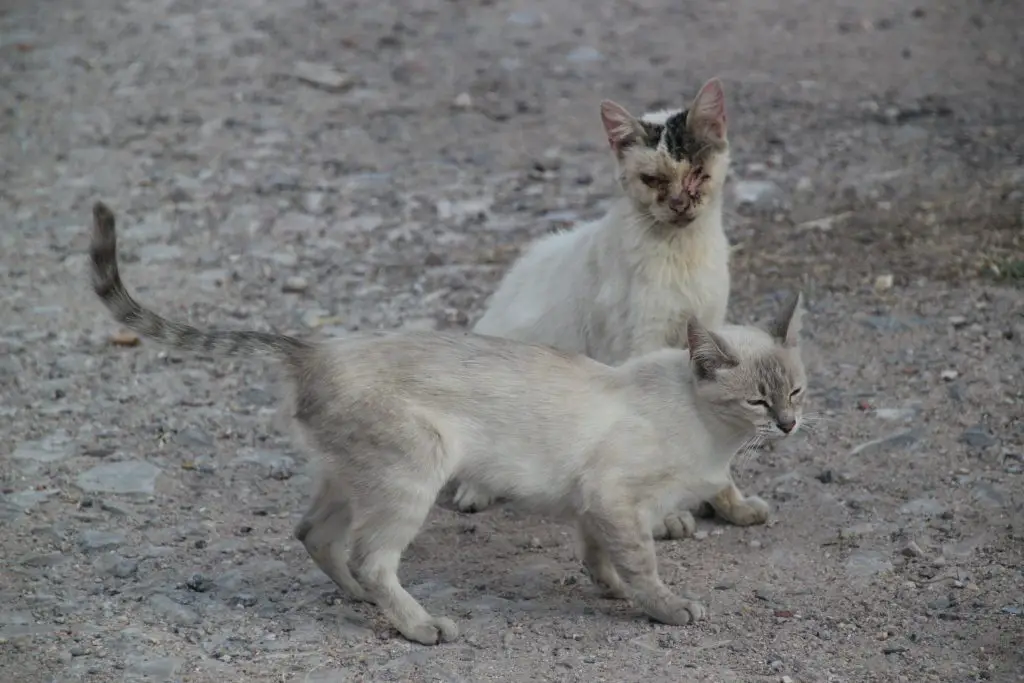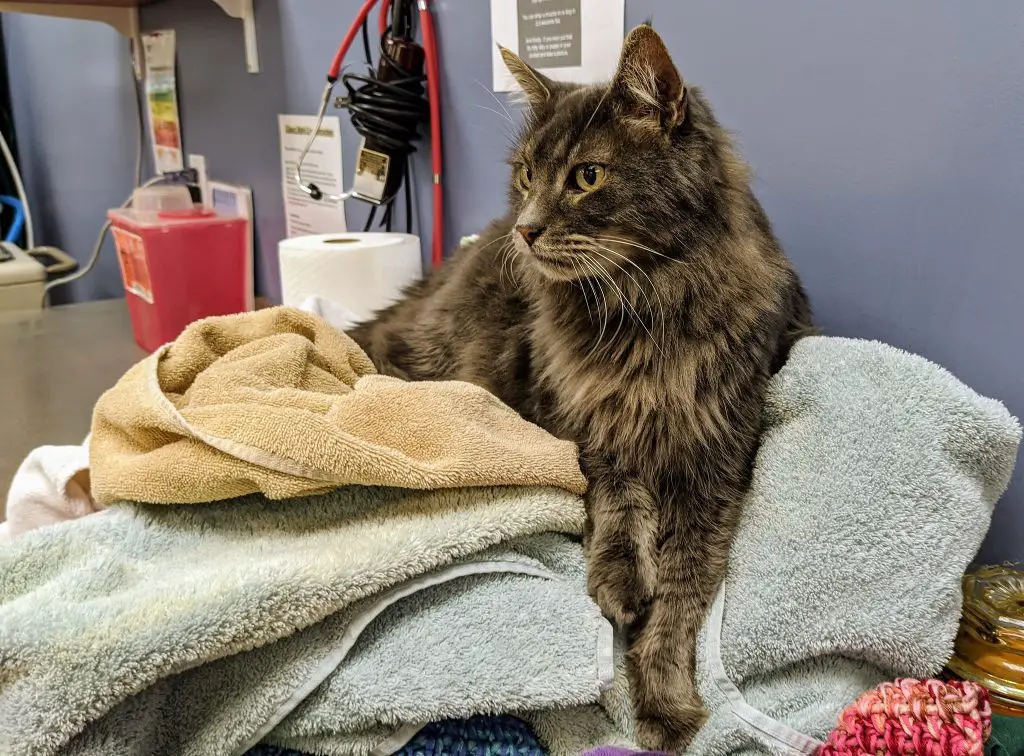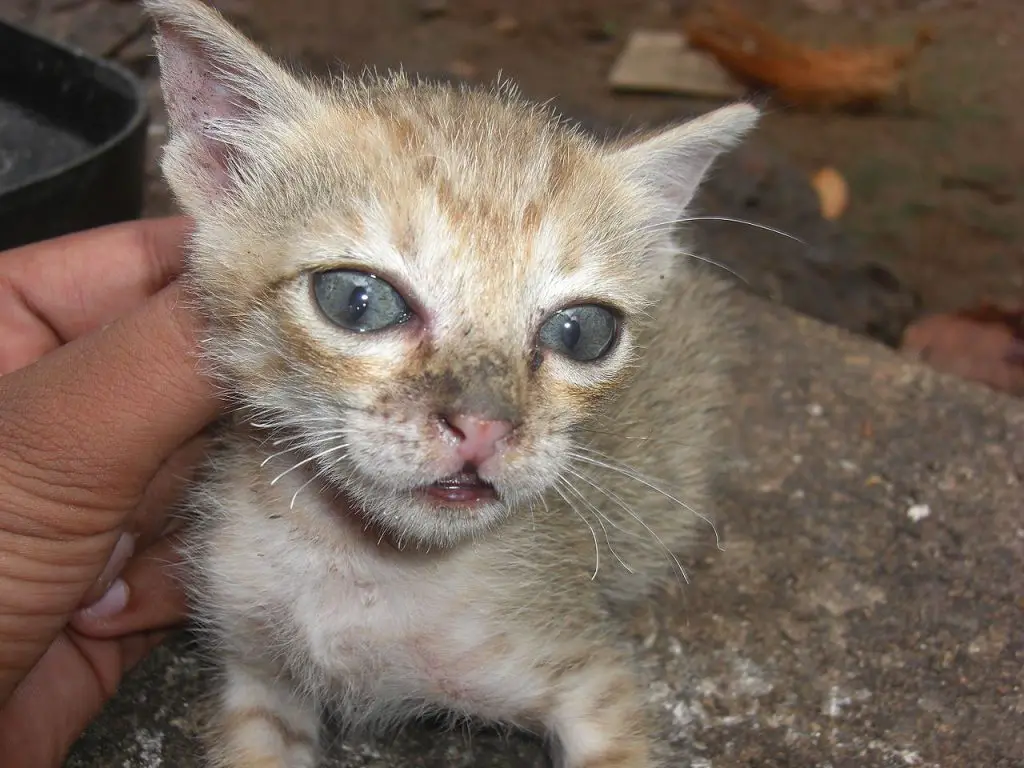If you have a cat, it’s important to be aware of the dangers of wolf worm infection. This parasitic infection can cause serious health problems in cats, and can even be fatal in some cases.
In this blog post, we will discuss what wolf worm is, how it is transmitted, and how to treat and prevent this dangerous infection.
Key Takeaway
- Wolf worms in cats, also known as warbles, are typically caused by the Cuterebra fly larvae, which cats can pick up while they’re outside, particularly when hunting rodents.
- Wolf worms, also known as Cuterebra or warbles, are the larvae of a type of botfly that embed themselves as parasites in mammals, often causing lumps or warbles on the skin.
- Symptoms of wolf worms in cats include lumps or warbles on the skin, often with holes in them, heavy breathing, lethargy, lack of coordination, neurological problems like seizures and behavioral changes, as well as possible vision loss.
- Treating a cat with wolf worms involves a professional veterinarian carefully removing the larvae using forceps, followed by prescribing antibiotics to combat any secondary bacterial infection and possibly administering Ivermectin medication if the worm has migrated internally.
What Are Wolf Worms
Wolf worms are the larvae of the Cuterebra fly, a parasite that can infest mammals, including cats, and cause a condition known as cuterebrosis.
As a veterinarian, I’ve encountered numerous cases of wolf worms, or Cuterebra larvae. These parasites belong to the Cuterebra fly and are known to infest various mammals, cats included. The condition they cause is referred to as cuterebrosis.
These larvae don’t initially target cats. Their typical hosts are rodents or rabbits, but cats often become accidental hosts when they come into contact with the larvae while hunting.
The larvae latch onto the cat’s fur and penetrate their skin, leading to an infestation.
How Cats Get Infected With Wolf Worms

Wolf worms, also known as Cuterebra larvae, are a type of parasitic infection that cats can acquire, typically when hunting rodents or rabbits.
The botfly larvae reside near the entryway to a rodent’s burrow, and when a cat encounters these areas while hunting, the larvae latch onto the cat’s fur and penetrate the skin.
This is how cats become accidental hosts for these parasites.
Symptoms of Wolf Worms In Cats

The symptoms of wolf worms in cats can range from visible lumps on their skin to neurological problems, such as vision loss, uncoordinated movements, behavioral changes, and seizures.
Visible Lumps or Warbles
One of the most common signs of a wolf worm infestation in cats is the presence of visible lumps or warbles on their skin. These lumps are typically found around the head and neck area. They often have a small hole in the center, which the larva uses to breathe. In my years as a veterinarian, I’ve seen many cases where owners first notice these lumps while petting or grooming their cats.
Neurological Symptoms
Wolf worms can also cause a variety of neurological symptoms in cats. These can include vision loss, lack of coordination, behavioral changes, and seizures. This usually occurs when a larva has migrated to the brain, a situation that requires immediate veterinary attention. In my practice, I’ve witnessed cats showing unexplained aggressive behavior or appearing disoriented, both of which could be indicative of a wolf worm infestation.
Respiratory Issues
Cats with wolf worms may also exhibit respiratory issues. These can include frequent sneezing, trouble breathing and coughing. A yellow-green nasal discharge may also be present. As a vet, I’ve had instances where owners bring their cats in for what they believe to be a respiratory infection, only to discover that the cause is actually a wolf worm infestation.
General Health Changes
Other general health changes may also be noticed in cats with wolf worms. These can include decreased appetite, lethargy, and changes in behavior. Any sudden change in your cat’s behavior or health warrants a visit to the vet. I’ve had owners bring their cats in for a general check-up, only to find a wolf worm infestation was causing their pet’s health issues.
How To Treat a Cat With Wolf Worms
Treating a cat with wolf worms involves careful removal of the parasite, treating any secondary bacterial infections with antibiotics, and potentially using specific worming medications.
1. Take your cat to the vet

The first thing you need to do is take your cat to the vet. They will be able to prescribe medication that will kill the worms.
There are a few different types of medications that your vet may prescribe for a cat with wolf worms. The most common medication is ivermectin, which is used to kill the larvae of the worm.
Another common medication is pyrantel pamoate, which is used to kill adult worms. Your vet may also prescribe other medications depending on the severity of your cat’s infection.
Treatment for wolf worms can be costly, so it is important to talk to your vet about all of your options before deciding on treatment. If left untreated, wolf worms can cause serious health problems in cats, so it is important to get your cat treated as soon as possible.
2. Prevent any access to rodents or other small animals

You will also need to make sure that your cat does not have access to any rodents or other small animals that could be infected with the worm. There are three ways that rodents can infect a cat with wolf worms.
The first way is if the rodent ingests the worm’s eggs and then the cat eats the infected rodent. The second way is if the cat eats an infected mouse or rat. The third way is if the cat comes in contact with contaminated soil or water that contains the worm’s larvae.
Symptoms of infection include coughing, vomiting, diarrhea, weight loss, and lethargy. If you think your cat has been infected, take them to the vet immediately.
Treatment involves giving the cat medication to kill the worms. Prevention is key and includes keeping cats indoors, using monthly preventative medications, and practicing good sanitation around your home.
3. Clean your home regularly

You will need to clean your house thoroughly and vacuum regularly to remove any eggs that might be present. To get rid of wolf worms, it is important to understand how they infest a home in the first place. Wolf worms are usually brought into the home of infected animals, such as rodents or rabbits.
They can also be carried in on contaminated food or water. Once inside, the worm larvae will mature and begin to lay eggs.
The eggs will hatch and the cycle will repeat itself. To break the cycle, it is important to remove all infected animals from the premises and clean any contaminated areas thoroughly. Treatment with an anti-parasitic medication may also be necessary.
If you think you may have a wolf worm infestation in your home, contact a pest control professional right away for assistance. Trying to tackle this problem on your own can be difficult and dangerous. A professional will have the knowledge and experience necessary to safely and effectively get rid of the wolf worms for good says Cuteness.
How Are Wolf Worms Diagnosed In Cats
Wolf worms in cats are usually diagnosed through physical examination, where the presence of a lump or warble on the skin suggests the parasite’s presence.
Physical Examination
The majority of wolf worm cases in cats are diagnosed through a physical examination. As a veterinarian, I look out for the typical sign of a lump or warble on the skin, often around the head and neck area. The lump usually has a small hole in the center, which is used by the larva to breathe.
Extraction of Larvae
In some instances, a definitive diagnosis can be made by extracting the larvae from the lump. This should be performed by a professional vet to avoid causing further harm to the pet. In my practice, I’ve found that careful extraction not only confirms the diagnosis but also initiates the treatment process.
Radiographic Imaging
Radiographic imaging like X-rays or ultrasound may be used if the larva has migrated internally and caused neurological symptoms. This helps in locating the larva and planning the necessary treatment. Over my years as a vet, I’ve used radiographic imaging to diagnose more severe cases of wolf worm infestation.
Laboratory Tests
Lastly, laboratory tests may be conducted to rule out other causes of the symptoms, especially when they are not typical of a wolf worm infestation. This could include blood tests or a biopsy of the lump.
Can Humans Get Wolf Worms From Cats?
Humans cannot directly contract wolf worms from cats as these parasites typically infest their hosts through a lifecycle that involves rodents and rabbits, not humans.
From my experience as a veterinarian, wolf worms, also known as Cuterebra larvae, usually infest hosts like rodents or rabbits.
Cats become accidental hosts when they come into contact with the larvae while hunting. The parasite latches onto the cat’s fur, penetrates their skin, and eventually forms a cyst or warble under the skin.
As such, humans are not natural hosts for these parasites and cannot directly contract them from cats.
However, it’s important to note that while the risk is minimal, humans could theoretically become accidental hosts in the same way cats do, if they were to come into direct contact with the larvae in an environment where Cuterebra flies are present.
Despite this, instances of Cuterebra infestation in humans are extremely rare.
In my years of practice, I have not encountered a single case. It’s far more likely for humans to get infected by other types of parasites that have a lifecycle involving humans.
FAQs
Q: What do wolf worms look like?
A: Wolf worms initially resemble small bumps on the cat’s skin. As they mature, they form a hole or opening with a small breathing pore. The worms themselves are white or cream-colored, and they can grow up to an inch in length.
Q: How do cats get infected with wolf worms?
A: Cats get infected with wolf worms when they come into contact with the eggs or larvae of the Cuterebra fly, typically through outdoor activities such as hunting or exploring in grassy areas.
Q: Can wolf worms infest indoor cats?
A: While it is less common, indoor cats can still get infected with wolf worms if they have access to areas where the Cuterebra flies lay their eggs, such as through open doors or windows.
Q: How long does it take for a wolf worm to mature?
A: The time it takes for a wolf worm to mature can vary, but it generally takes around 3 to 4 weeks for the larva to develop into an adult fly.
Q: How are wolf worm infections treated in cats?
A: Treatment for wolf worm infections typically involves the removal of the larvae by a veterinarian. This is done by making a small incision to extract the worm and then thoroughly cleaning the area to prevent infection.
Q: Can humans get infected with wolf worms from cats?
A: While it is rare, humans can potentially get infected with wolf worms if they come into contact with the larvae. It is important to take precautions when handling an infected cat and to wash hands thoroughly afterwards.
Q: How can wolf worm infections in cats be prevented?
A: To prevent wolf worm infections in cats, it is advisable to keep them indoors and minimize their exposure to areas where Cuterebra flies are prevalent. Regular grooming and inspection of the cat’s skin can also help detect any potential infections early on.
Conclusion and final thoughts
In conclusion, wolf worms in cats can be caused by a variety of factors such as poor hygiene, exposure to contaminated environments, and weak immune systems.
It is important for cat owners to regularly check and clean their pet’s living spaces to prevent infestations.
Additionally, keeping cats healthy through proper nutrition and regular veterinary care can help strengthen their immune system and make them less susceptible to worm infestations.




